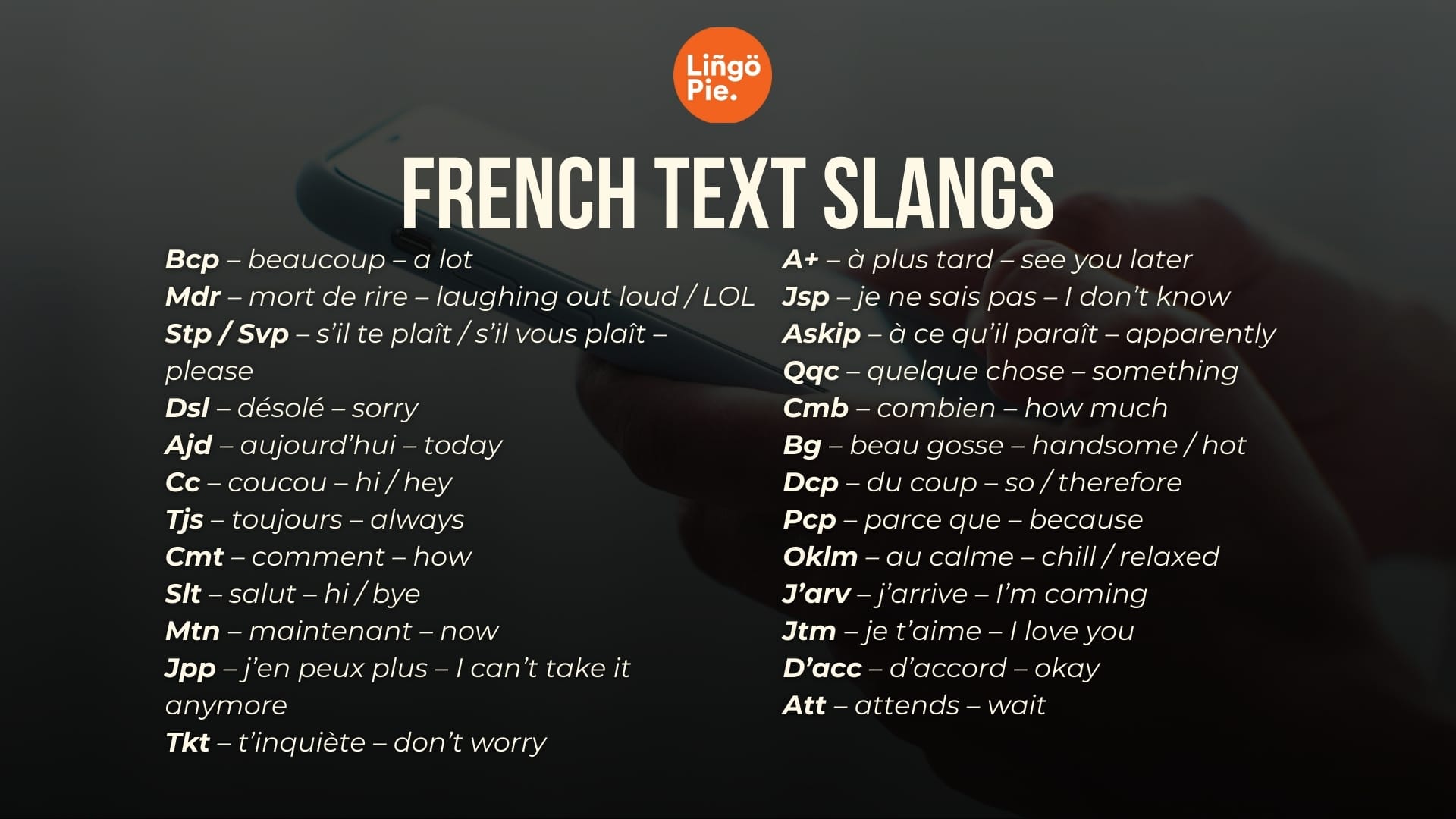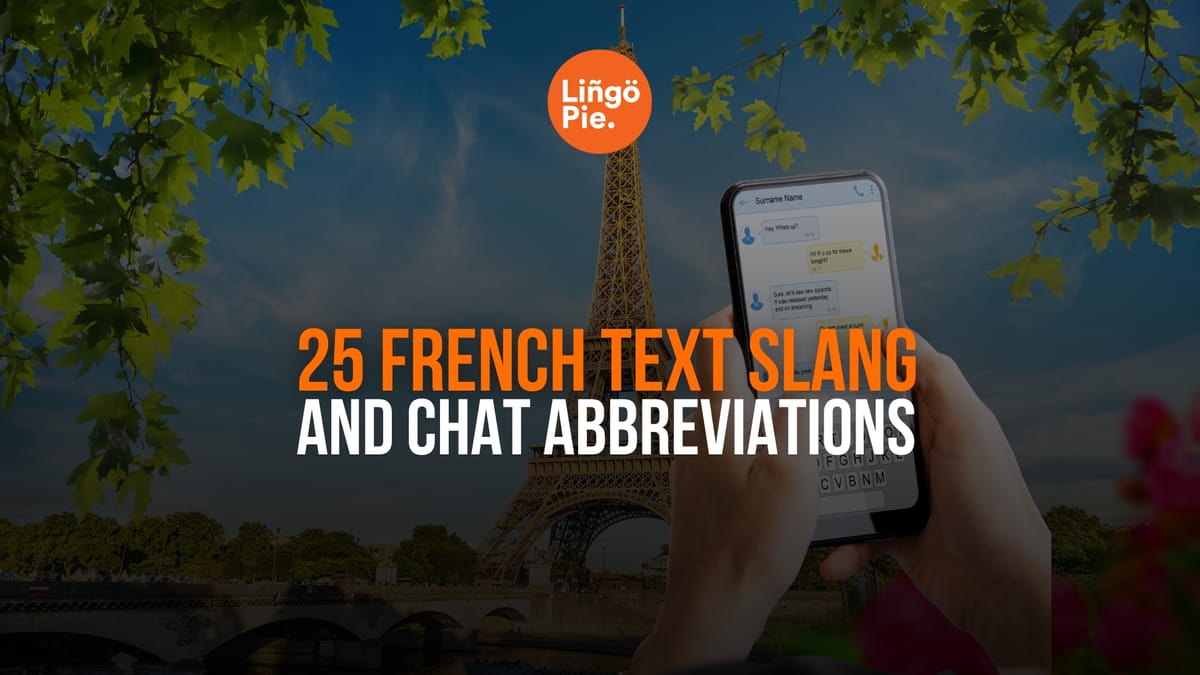Ever stared at a French text message feeling like you're trying to crack a secret code? I've been there! A few years back, I was chatting with my French friend, feeling pretty confident about my language skills.
Then bam! My screen filled with "mdr", "stp", "askip". Suddenly, my confidence took a nosedive.
Was this still French?
Had I missed a crucial lesson somewhere?
If you've ever felt this way, you're not alone. French texting slang can feel like a whole new language, even if you're comfortable with everyday French. But don't worry – we're about to learn French slang words that are actually used by native speakers.
Allez, c'est parti !
Best Way to Learn French on Your Own [2025 Guide]
9 Best Short Stories In French For Beginners
80 Hilarious Puns And Jokes In French

Why Learn French Slang?
Let's get real – if you're serious about learning French on your own, you can't ignore slang. You see, the French people use slang all the time in everyday talk. Without it, you'll often miss what people really mean. Imagine only knowing formal French in a casual chat – you'd stick out like a sore thumb.
The truth is that French slang helps you understand jokes, follow fast conversations, and connect with French speakers naturally.
How To Learn French Slang?
Now that we've established why French slang is crucial for truly mastering the language, you might be wondering how to go about learning it. After all, you won't find most of these expressions in your standard French textbook!
But don't worry – picking up French slang can be a fun and engaging process if you approach it the right way. The secret? The key to learning French slang effectively is through French immersion.
You need to surround yourself with authentic, everyday French as much as possible. This means going beyond traditional language learning methods and tapping into the rich world of French popular culture and social interaction.
But where should you start?
There are several effective strategies you can use to build your French slang vocabulary.
- Use Social Media: Follow French influencers, join French-language groups, listen to trending French music, and interact with native speakers on platforms like Instagram, TikTok, and Twitter.
- Take Language Courses: Look for French courses that include modules on colloquial French and modern slang.
- Get a Tutor: A native French online tutor can teach you current slang and explain when and how to use it appropriately.
- Watch French Movies and TV Shows: With Lingopie's features, you can watch French content with interactive subtitles, helping you learn slang in context. You'll hear how native speakers really talk and pick up on the latest expressions.
Still unsure where to start? Here are 8 tips to boost your French learning fast!

French Text Slang
In this section, I rounded up the best French text abbreviations and slang terms to truly help you during conversations online, via text, and on social media platforms. Each entry includes the abbreviated form, its full French phrase, English translation, and a practical example.
Ready to level up your French texting game? Let's jump in!

1. Bcp (beaucoup) – a lot
Bcp stands for beaucoup. In informal conversation, it is quite common to use "bcp" to express emphasis or exaggeration.
Example: J'ai bcp aimé le film "Avatar 2". I liked the movie "Avatar 2" a lot.
2. Mdr (morte de rire) – laughing out loud
Mdr is an abbreviation used in French for mort de rire, which is equivalent to Lol in English, rsrsrsrs in Portuguese and jajajaja in Spanish.
Example: La série "The Office" est vraiment marrante, j'ai été mdr tout le temps. The series "The Office" is hilarious, I was laughing out loud all the time.
3. Stp or svp (s'il vous plait, s'il te plait) – please
"Stp" (informal) and "svp" (more formal) are abbreviations for "s'il te plaît" and "s'il vous plaît" respectively, both meaning "please". They're used to make polite requests in written communication.
Example: Peux-tu m'envoyer les photos de gala hier soir, stp? Can you send me the photo of gala last night, please?
4. Dsl (désolé) – sorry
"Dsl" is short for "désolé" (sorry). It's used to express apology or regret in casual digital conversations.
Example: Dsl, j'ai oublié de te répondre hier. Sorry, I forgot to reply to you yesterday
5. Ajd (aujourd'hui) – today
"Ajd" abbreviates "aujourd'hui" (today). It's commonly used to refer to the current day in informal written exchanges.
Example: Je vais aller voir le film "La La Land" ajd. I'm going to watch the movie "La La Land" today
6. Cc (coucou) – hi/hey
This word is used very often in everyday French conversation. It can be translated as "hi, my darling" in English and is often used among friends, family members, or acquaintances to greet in a very informal and affectionate way. What a warm-feeling word!
Example: Cc, ca va? Hi, how are you?
7. Tjs (toujours) – always
"Tjs" abbreviates "toujours" (always). It's used to express frequency or consistency in casual written conversations.
Example: J'adore regarder les films de Wes Anderson, ils sont tjs très originaux. I love watching Wes Anderson's movies, they are always very special.
8. Cmt (comment) – how
"Cmt" stands for "comment" (how). It's commonly used to ask questions about manners or methods in informal texts.
Example: Cmt s'appelle le personnage principal du film "Le Fabuleux Destin d'Amélie Poulain"? How is the main character of the movie "Amélie" called?
9. Slt (salut) – hi/bye
The word "salut" has two meanings, to say "hi" or "bye" in informal situations.
Example: Slts, je dois y aller maintenant . Hi/Bye, I have to go now
Read also: Curse Words in the French Language: Using French Swear Words Like a Pro
10. Mtn (maintenant) – now
"Mtn" is short for "maintenant" (now). It's used to indicate the present moment or immediate action in informal digital communication.
Example: Je peux pas parler mtn, je suis en train de regarder un match. I can't talk now, I'm watching a football game
11. Jpp (j'en peux plus) – I can't take it anymore
jpp is an informal and colloquial expression that can be translated to I can't take it anymore" or I've had enough in English. This expression is often used to express frustration, exhaustion, or exasperation with a situation or person.
Example: jpp de travailler autant, je suis crevé. I can't take working so much anymore, I'm exhausted.
12. Tkt (t'inquiète) – don't worry
In speaking French people don't pronounce ne, so ne t'inquiète pas is shortened t'inquiète pas which can be translated to "don't worry" in English.Tkp is a shorter version of t'inquiète. You can see they cut off two words ne and pas to save time and space.
Example: Tkt, tout va bien se passer. Don't worry, everything will be fine.
13. D'acc (d'accord) – okay
It's widely used in informal written communication to express agreement or acknowledgment. This abbreviation is quick to type and universally understood among French speakers in casual contexts.
Example: D'acc, on se voit demain alors. Okay, see you tomorrow then.
14. Att (attends) – wait
"Att" is an abbreviation of "attends" (wait). It's commonly used in text messages when you want the other person to pause or wait for a moment.
Example: Att, je te reponds tout de suite. Wait, I'll reply to you right away.
15. A+ (à plus tard) – see you later
"A+" is a creative abbreviation for "à plus tard" (see you later). The "+" sign is used to represent "plus" (more/later).
Example: Je dois y aller maintenant, A+. I have to go now, see you later.
16. Jsp (je ne sais pas) – I don't know
Jsp is an abbreviation for "I don't know" This expression is often used in responsibility for a question or when not sure about something
Example: Jsp on mange quoi ce soir, tu as une idée? I don't know what we will eat tonight, do you have any idea?
17. Askip (à ce qu'il parait) – apparently
"Askip" is a slang expression that is commonly used in French, especially among young people. It is an abbreviation of "à ce qu'il paraît" which means "apparently" or "so they say" in English.
Example: Askip, le film "Parasite" a remporté plusieurs prix cette année. Apparently, the movie "Parasite" won several awards this year.
18. Qqc (quelque chose) – something
"Qqc" is an abbreviation of "quelque chose" (something). It's commonly used in informal written communication to save time and space. This shorthand is versatile and can be used in various contexts where "something" would be appropriate in English.
Example: Je veux regarder qqc de léger ce soir, t’as des recommandations. I want to watch something light tonight, do you have any recommendations?
19. Cmb (combien) – how much
This abbreviation is frequently used in text messages and online chats when asking about quantity, price, or amount.
Example: Cmb ça coûte d'aller voir un film au cinéma ces jours-ci? How much does it cost to go to the cinema these days?
20. Bg (beau gosse) – handsome guy
This slang term can be used to refer to someone attractive or good-looking, It is similar to the word handsome in English. You can refer to a girl as well as a boy as a bg.
Example: J'ai rencontré un bg au cinéma hier soir, il m'a invité à aller voir un film ensemble . I met a handsome guy at the cinema last night, he invited me to watch a movie together.
21. Dcp (du coup) – so/therefore
It is often used to indicate a consequence or a result of something that has just been said, or to introduce a conclusion.
Example: Je suis fatigue, dcp je vais me coucher. I am tired, so I am going to bed.
22. Pcp (parce que) – because
"Pcp" is a shorthand for "parce que" (because). It's used to introduce a reason or explanation in informal text messages, saving time and characters.
Example: J'ai décidé d'apprendre le Portugais pcp j'ai bien la musique brésilienne. I decided to learn Portuguese because I love Brazilian music.
23. Oklm (au calme) – calm/relaxed
"Oklm" is derived from "au calme" (calmly or relaxed). It's used to describe a peaceful, relaxed state or situation. This abbreviation is particularly popular among younger French speakers in casual digital communication.
Example: J'ai regardé le film "Pulp Fiction" oklm chez moi hier soir, c'était super. I watched the movie "Pulp Fiction" calmly at home last night, it was great.
24. J'arv (j'arrive) – I'm coming
"J'arv" is a shortened version of "j'arrive" (I'm coming/I'm arriving). It's commonly used in text messages to quickly inform someone that you're on your way or will arrive soon. This abbreviation reflects the informal nature of texting and the desire for rapid communication.
Example: J'arv dans 5 minutes, j’suis en train de finir d’acheter un Kebab. I'm coming in 5 minutes, I'm finishing buying a Kebab
25. Jtm (je t'aime) – I love you
jtm is a shorthand way of saying je t'aime, which is a French expression that means "I love you." This particular expression is frequently used to convey feelings of love or affection towards someone.
Example: Jtm plus que tout. I love you more than anything.

French Internet Slang
With over 56 million online users — that’s a whopping 96% of the population — French internet slang is no longer a nice-to-know, but a must-know for anyone looking to connect with French speakers online.
To help you get started, here's a table of common French internet slang terms with their English equivalents:
| English | French |
|---|---|
| Hello | Bjr (Bonjour) |
| And | É (Et) |
| Who | Ki (Qui) |
| You | Twa (Toi) |
| Cute/Sweet | Chou |
| Why | Pq / Pk (Pourquoi) |
| Thanks | Mrc (Merci) |
| Something | Qlc (Quelque chose) |
| What's up? | Koi29 (Quoi de neuf) |
| Laugh out loud | Mdr (Mort de rire) |
| Me too | Moi oci (Moi aussi) |
| See you | A+ (À plus) |
| Okay | Dak (D'accord) |
| I don't know | Jsp (Je ne sais pas) |
| Good night | Bn (Bonne nuit) |
| What | Koi (Quoi) |
| How are you? | Sa va? (Ça va?) |
| Cool | Grav (Grave) |
| Because | Psk (Parce que) |
| Now | Mtn (Maintenant) |
Learn French With Lingopie
Now that you're equipped with these essential French text slang terms, you're ready to dive deeper into the world of casual French communication. But remember, learning doesn't stop here – it's an ongoing process, especially with language that evolves as quickly as internet slang.
So, how can you keep up and truly master these expressions in context? This is where Lingopie comes in. You see, Lingopie's features offer a unique and engaging way to immerse yourself in authentic French content.
By watching French movies and TV shows with interactive subtitles, you'll hear how native speakers actually use these slang terms in real-life situations. You'll naturally pick up on tone, context, and even discover new expressions as they emerge.
With Lingopie, you can:
- Learn at your own pace
- Hear slang used in natural conversations
- Improve your listening skills
- Absorb French culture along with the language
Ready to take your French skills to the next level? Give Lingopie a try today!
Frequently Asked Questions:
1. How to flirt in French text?
Use playful emojis, cute nicknames, and light teasing. Try flirty lines like:
– T’es toujours aussi mignon(ne) ? 😘 (Are you always this cute?)
– J’ai pensé à toi toute la journée 💭 (I thought about you all day).
French flirting is subtle—think charm, not pickup lines.
2. What does TKT mean in texting?
TKT = T’inquiète → “Don’t worry!”
Super common and casual. Example: TKT, je gère (Don’t worry, I got this).
3. How to text like a French person?
Use tons of abbreviations + casual slang:
– mdr (mort de rire) = LOL
– pk = pourquoi (why)
– jsuis = je suis
Throw in some emojis and chill vibes, and voilà!
4. What is the French text slang for IDK?
J’sais pas or the shorter jsp = “I don’t know”
You'll see jsp a lot in casual convos, especially with younger people.
5. How do I be flirty over text (in French)?
Keep it playful and a little mysterious. Say things like:
– Tu me manques déjà... (I already miss you...)
– Arrête d’être si irrésistible 😏
Use soft teasing, emojis, and show interest without being too intense.









